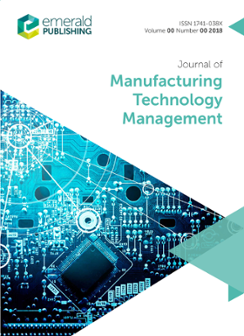通过工业4.0推动组织绩效的智能化:系统视角
IF 7.3
2区 工程技术
Q1 ENGINEERING, INDUSTRIAL
引用次数: 1
摘要
目的商业的国际化发展了生产价值链,并给工业生产带来了绩效挑战。工业4.0是工业流程的数字化转型,有望通过智能功能实现性能改进。这项研究调查了数字化转型如何通过采用系统视角来推动智能化,从而转化为性能提升。设计/方法论/方法本研究使用定性研究来收集数字化转型从业者的生活经历数据,以进行理论发展。它使用了对行业专家的半结构化访谈,并应用Gioia方法进行分析。研究发现,企业智能是数字化转型发展起来的一种组织能力,是工业4.0背景下的整合功能和组织绩效提升的推动者。该研究确定,绩效提升体现在生产力、可持续性、安全性和客户体验方面,代表行业4.0的绩效指标。研究局限性/含义本研究为数字化转型和生产管理文献提供了一个模型,该模型在数字化转型和组织成果之间的联系中插入了智慧。实际含义研究表明,数字化转型计划应侧重于发展智能,而不是技术实施,这必须被视为一种扶持活动。独创性/价值现有研究认识到技术对工业生产绩效的积极影响。该研究解决了工业4.0价值创造过程中缺失的一个环节。它采用了一种系统视角来确定智能在将技术使用转化为绩效结果中的作用。智能能力一直是组织利用数字化转型文献中缺失的关键环节。该研究通过构建工业4.0价值模型来推进理论发展,该模型在数字技术、智能和组织绩效之间建立了联系。本文章由计算机程序翻译,如有差异,请以英文原文为准。
Driving smartness for organizational performance through Industry 4.0: a systems perspective
PurposeThe internationalization of business has grown the production value chains and created performance challenges for industrial production. Industry 4.0, the digital transformation of industrial processes, promises to deliver performance improvements through smart functionalities. This study investigates how digital transformation translates to performance gain by adopting a systems perspective to drive smartness.Design/methodology/approachThis study uses qualitative research to collect data on the lived experiences of digital transformation practitioners for theory development. It uses semi-structured interviews with industry experts and applies the Gioia methodology for analysis.FindingsThe study determined that enterprise smartness is an organizational capability developed by digital transformation, it is a function of integration and the enabler of organizational performance gains in the Industry 4.0 context. The study determined that performance gains are experienced in productivity, sustainability, safety and customer experience, which represents performance metrics for Industry 4.0.Research limitations/implicationsThis study contributes a model that inserts smartness in the linkage between digital transformation and organizational outcomes to the digital transformation and production management literature.Practical implicationsThe study indicates that digital transformation programs should focus on developing smartness rather than technology implementations, which must be considered an enabling activity.Originality/valueExisting studies recognized the positive impact of technology on performance in industrial production. The study addresses a missing link in the Industry 4.0 value creation process. It adopts a systems perspective to establish the role of smartness in translating technology use to performance outcomes. Smart capabilities have been the critical missing link in the literature on harnessing digital transformation in organizations. The study advances theory development by contributing an Industry 4.0 value model that establishes a link between digital technologies, smartness and organizational performance.
求助全文
通过发布文献求助,成功后即可免费获取论文全文。
去求助
来源期刊

Journal of Manufacturing Technology Management
Engineering-Control and Systems Engineering
CiteScore
16.30
自引率
7.90%
发文量
45
期刊介绍:
The Journal of Manufacturing Technology Management (JMTM) aspires to be the premier destination for impactful manufacturing-related research. JMTM provides comprehensive international coverage of topics pertaining to the management of manufacturing technology, focusing on bridging theoretical advancements with practical applications to enhance manufacturing practices.
JMTM seeks articles grounded in empirical evidence, such as surveys, case studies, and action research, to ensure relevance and applicability. All submissions should include a thorough literature review to contextualize the study within the field and clearly demonstrate how the research contributes significantly and originally by comparing and contrasting its findings with existing knowledge. Articles should directly address management of manufacturing technology and offer insights with broad applicability.
 求助内容:
求助内容: 应助结果提醒方式:
应助结果提醒方式:


